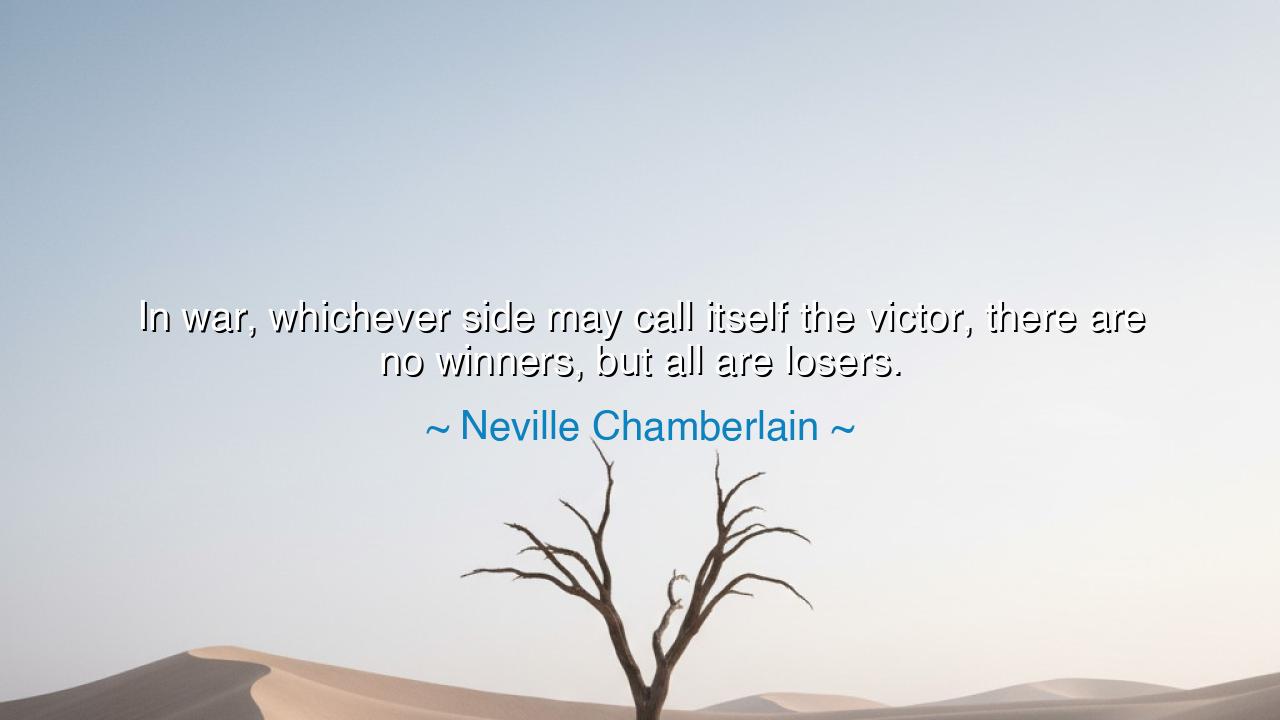
In war, whichever side may call itself the victor, there are no
In war, whichever side may call itself the victor, there are no winners, but all are losers.






Neville Chamberlain, though remembered most for his ill-fated attempt to preserve peace, spoke words of profound truth when he declared: “In war, whichever side may call itself the victor, there are no winners, but all are losers.” In this saying lies not weakness, but eternal wisdom. For though banners may rise in triumph, though parades may march with music and glory, the soil beneath those steps is always heavy with blood, the air always thick with grief. No side emerges untouched, for the wounds of war are shared by all humanity.
The origin of this thought is clear: Chamberlain lived through the devastation of the First World War, that “Great War” which promised victory but delivered only sorrow. Nations proclaimed themselves triumphant, but in the ruins of Europe, millions lay dead, economies collapsed, and an entire generation bore scars visible and invisible. The victors themselves were hollow, for the prize of conquest was outweighed by the burden of loss. Chamberlain knew this history well, and when he spoke, he sought to warn his people that war, however just or inevitable, leaves only ashes in its wake.
To say there are no true winners is not to deny courage or sacrifice, but to reveal the hidden cost. A battlefield may be seized, a city occupied, an enemy subdued — yet behind each apparent victory lies a graveyard. The widows and orphans of both sides mourn alike, the homes of both sides are burned, the fields of both sides lie barren. The coin of war is always paid in suffering, and it is always exacted from the innocent as well as the guilty. Thus, even the so-called victor stands diminished, crowned not only with laurels but with shadows.
Consider the end of World War II. The Allies stood as victors, having broken the might of Nazi Germany and Imperial Japan. Yet Europe lay in ruins, its cities bombed to dust, its people starving. Millions had perished in concentration camps, millions more on battlefields. Even the victors were exhausted, carrying wounds that would shape generations. In the East, the Soviet Union lost tens of millions of its sons and daughters; in the West, Britain emerged victorious but impoverished, its empire crumbling. America, though stronger, bore the eternal burden of having unleashed the atomic fire upon Hiroshima and Nagasaki. Victory was real, yet who among them could say they truly won?
Chamberlain’s words also speak beyond nations, to the hearts of men. For in every quarrel, in every conflict, even when one party triumphs, both hearts are wounded. A friendship broken, a family divided, a people torn apart — here too we find that there are no winners, only losers who pay in sorrow for the victory of pride. Whether in the wars of nations or the wars of the spirit, the law is the same: destruction cannot yield true triumph.
The lesson is clear and enduring: seek peace before the sword is drawn. Let war be the last resort, not the first impulse. Honor the sacrifice of those who fight, but never glorify the conflict itself. In your own life, be quick to reconcile, slow to anger, and unwilling to wound others merely to prove yourself right. For the path of peace preserves what the path of strife can only destroy.
Therefore, my children, remember Chamberlain’s warning. When you hear the cries of victory, listen also for the silence of the graves. When others speak of conquest, speak of compassion. Support leaders who seek to prevent war rather than to profit from it, and in your daily life, build bridges rather than walls. For true victory is not found in the ruin of others, but in the flourishing of all. And until mankind learns this lesson, every war will make us all losers together.






AAdministratorAdministrator
Welcome, honored guests. Please leave a comment, we will respond soon